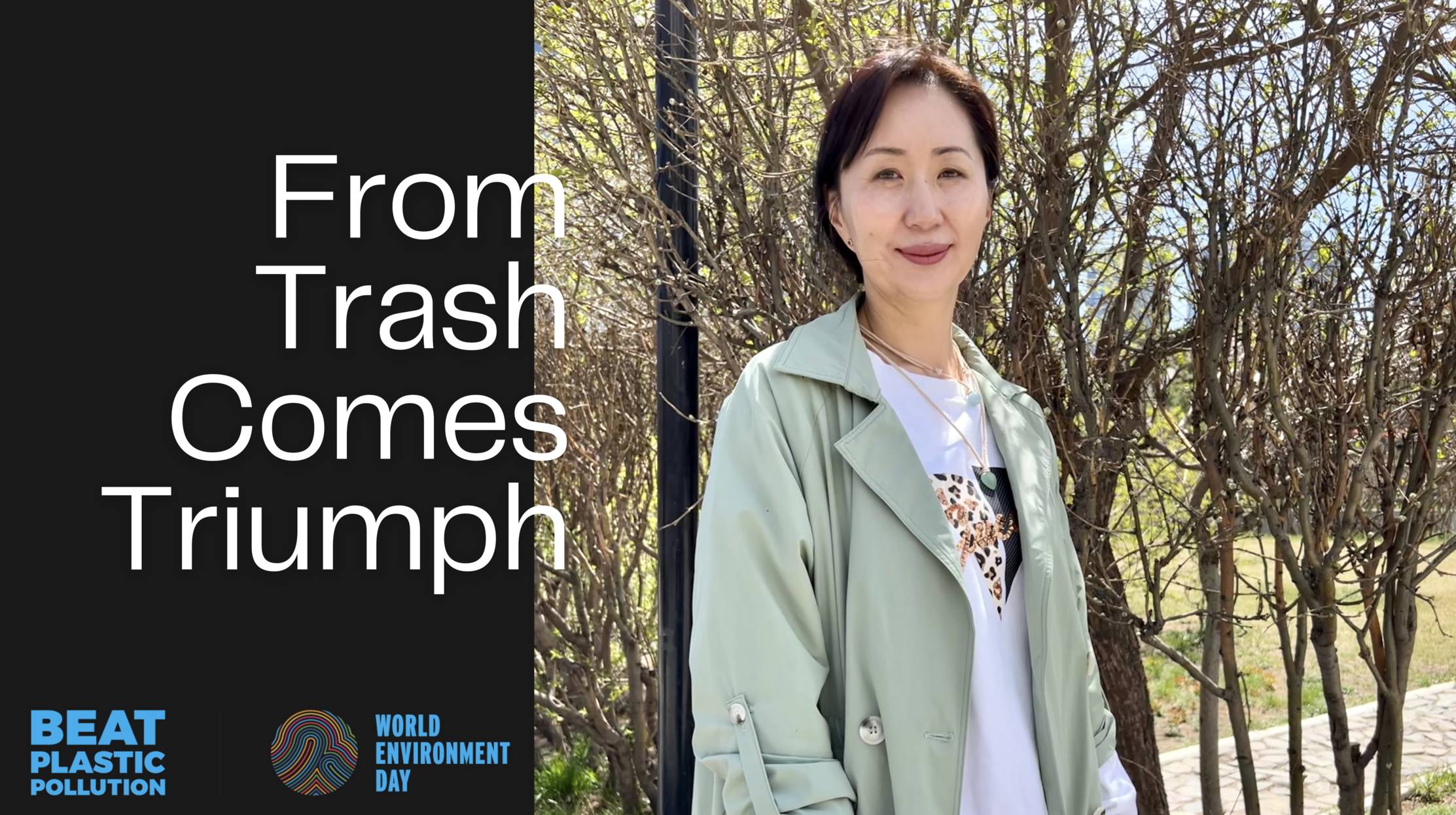
I had scheduled a meeting with Narantuya Sharkhuu on a bitterly cold and windy day in a small, cozy café. Ulaanbaatar, the city we call home, holds the distinction of being the coldest capital city in the world. True to its reputation, the temperature hovered near 0 degrees, despite it being late May. Narantuya, a tall and elegant lady in her late 40s, greeted me with the most enchanting smile when she spotted me. She was dressed in attire commonly seen on mountain hikers.
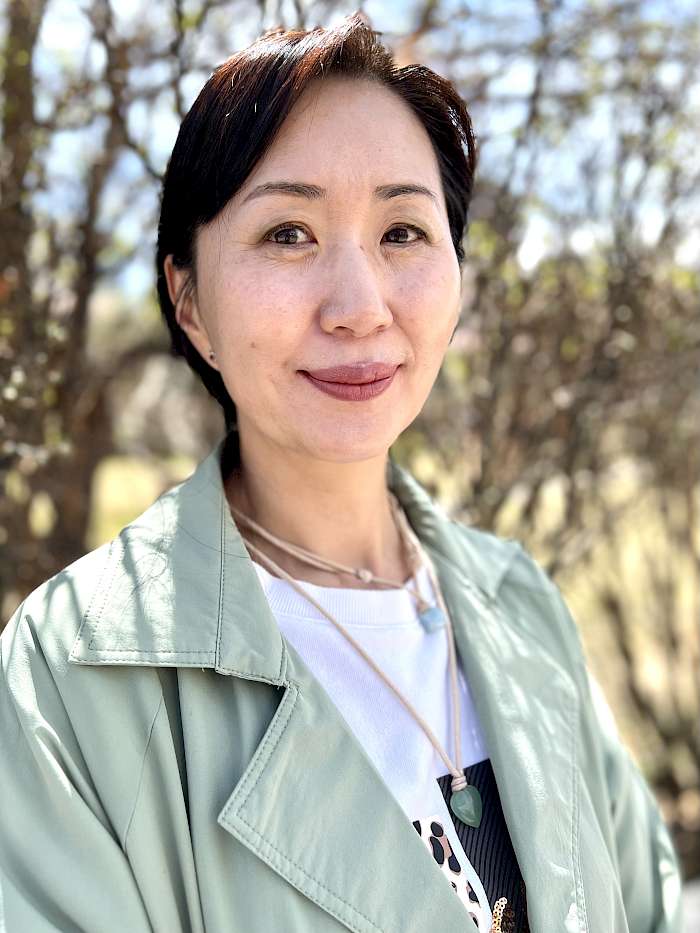 Narantuya is a woman of many talents and responsibilities. She is a seasoned accountant, a certified yoga instructor, a government agent of the micro-district, and the head of her local Homeowners' Association (HOA). She is also one of the leading voices advocating for proper waste sorting in Ulaanbaatar.
Narantuya is a woman of many talents and responsibilities. She is a seasoned accountant, a certified yoga instructor, a government agent of the micro-district, and the head of her local Homeowners' Association (HOA). She is also one of the leading voices advocating for proper waste sorting in Ulaanbaatar.
In 2019, her community faced the alarming prospect of losing the playground land adjacent to their apartment building, which had been their home for over two decades. Corruption deeply embedded within Mongolian politics allowed companies to illegally bribe authorities, resulting in the unauthorized fencing of public spaces and the construction of commercial estates against the wishes of the residents. Unfortunately, such practices are all too common in Ulaanbaatar. Given the prime location of her neighborhood, situated close to the city's central point, the imminent threat of losing this small yet precious green space became increasingly apparent.
Ulaanbaatar is home to over half of Mongolia's 3.3 million population, with seventy percent of its residents living in ger districts without central heating or a plumbing system. The remaining population predominantly resides in apartment complexes, resembling the aesthetic of most eastern European cities. One can easily distinguish between old and new buildings by examining the spaces between them. Over the past 30 years, rather than expanding the city outward, new structures have been erected within the gaps of existing buildings, resulting in a concrete jungle with minimal green space.
During this crucial moment, when the public space near her home faced the potential threat of being transformed into a shopping center or even a nightclub, Narantuya united with the residents of the affectionately nicknamed 'the tall three' apartments to resist the encroachers. The community fought against them for months, and their struggle even gained media attention, shining a spotlight on their battle for the small patch of land. Initially, 'the tall three' had a homeowners' association (HOA), but suspicions arose that it had been compromised or influenced by the opposing side. As a result, the residents decided to disband the existing HOA and establish a new one.
At that time, Narantuya was employed as an accountant in a private company and had no intention of getting involved with the HOA, let alone spearheading a waste sorting rally in her neighborhood. She and her husband had moved to one of the 'the tall three' apartments in 1998, shortly after their marriage, and together they raised four children. Naturally, she developed a deep affection for the area and its community.
After successfully defending their land and removing the corrupt HOA, Narantuya voluntarily stepped up to serve as the financial advisor for the newly formed 'Altayn Baraa' HOA. Recognising the importance of her expertise and driven by her love for the community, she took on the responsibility of managing the association's finances. However, Narantuya had not initially planned to stay in the HOA indefinitely. That changed when the newly elected head of the HOA neglected their responsibilities, failing to show up for work. As a result, all the burdens and tasks fell onto Narantuya's shoulders. She found herself unexpectedly thrust into a position of leadership within the HOA, which compelled her to reconsider her plans and commit herself to the community for the time being. She accepted the role of 'Altayn Baraa' HOA's head.
When Narantuya began her role, she encountered a disheartening situation—the 40-year-old apartment complex was in a state of disrepair. The hallways were dimly lit and neglected, and waste management was a significant concern. Narantuya had a strong desire to revitalize the neighborhood and bring about positive change. However, she felt overwhelmed by the daunting task ahead and struggled to determine the best place to begin the transformation process. Narantuya lacked basic knowledge about waste recycling processes and logistics. Unaware that recycling plants typically send their own trucks to collect the plastic collected by the HOA, she used to personally cover the costs of hiring trucks to transport the plastic bottles.
The year 2021 marked a turning point and brought the seed of change for Narantuya. 'Altayn Baraa' HOA was approached by the team from Sustainable Plastic Recycling in Mongolia (SPRIM), a project funded by the EU under its SWITCH-Asia programme. The HOA was in one of the target pilot areas of the project, which aimed to establish an efficient waste management system for plastic waste and promote the development of the plastic recycling industry.
Narantuya and her team actively participated in the awareness-raising activities and received training on proper waste sorting techniques from the SPRIM project. As part of the pilot programme, they were provided with several sorting bins to facilitate the process.
When questioned about the challenges of encouraging residents to adopt the habit of waste sorting, Narantuya responded, "There were absolutely none. While there were some minor obstacles, overall, it was a remarkably positive experience." The initial and most difficult step was introducing the concept of waste sorting to the community. Fortunately, Narantuya had participated in the 'Training of Trainers' programme organised by the SPRIM project. This training equipped her with the essential knowledge and skills to persuade and engage people, emphasising the importance of environmental consciousness and shedding light on the gravity of the current environmental situation and the dire consequences if we don’t start acting now.
After gaining awareness of the alarming state of waste management through Mongolian waste data and statistics, there was no turning back for the residents. The realisation of the severity of the situation ignited a strong sense of enthusiasm among the community to embrace waste sorting practices. Remarkably, children were the quickest to adapt to this new "regime." Their eagerness and willingness to participate influenced their friends and schoolmates throughout the area, rapidly spreading the habit of waste sorting.
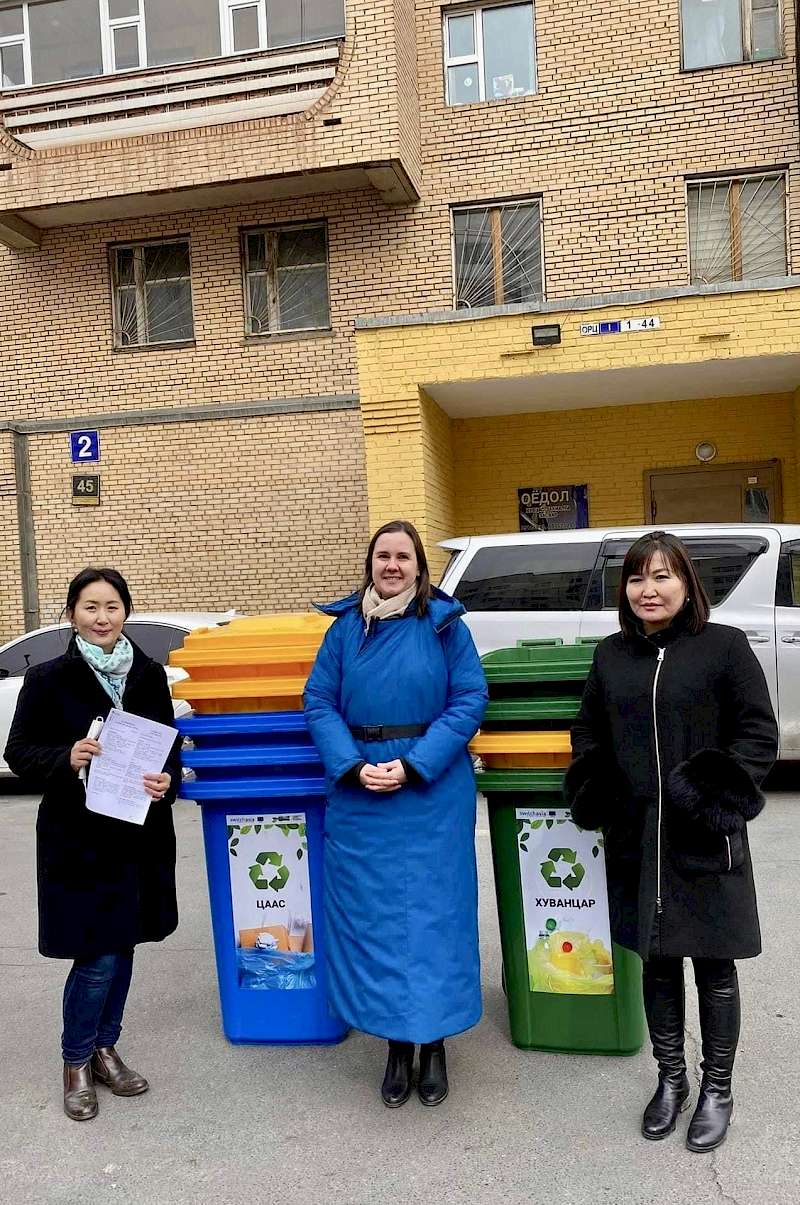
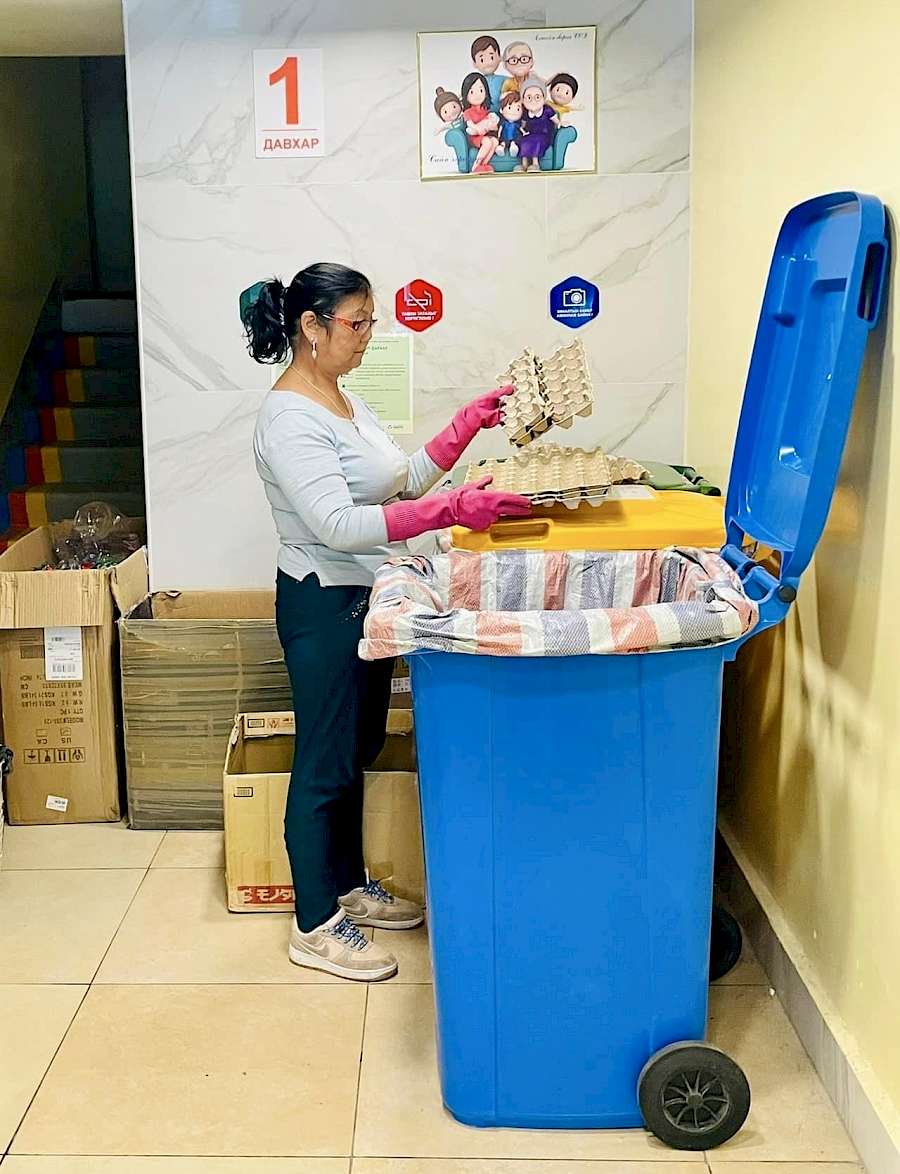
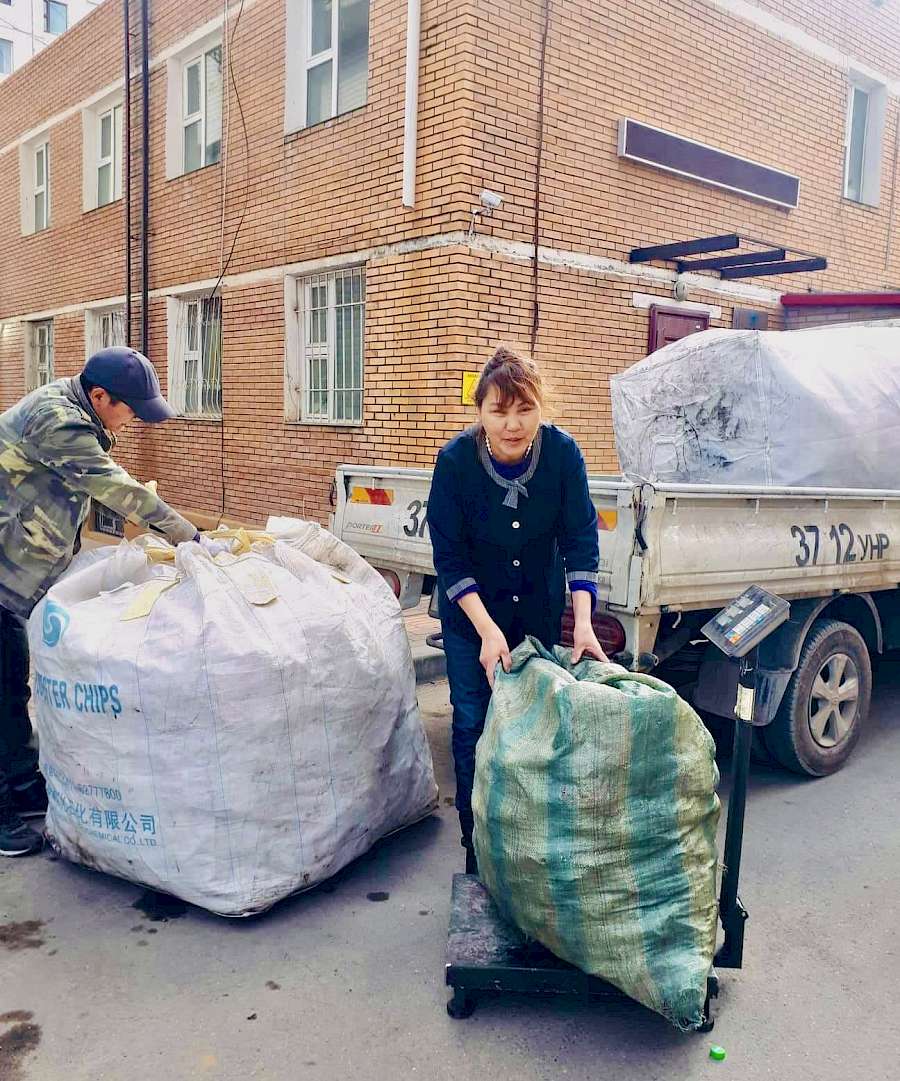
Narantuya also understood the significance of repetition and reinforcement in ensuring that waste sorting practices were ingrained in the residents' minds. She took proactive measures by placing notices emphasising the importance of sorting waste throughout the apartment complex. Additionally, she actively shared educational posts in residents' Facebook groups and organised meetings to ensure that people had ample opportunities to fully comprehend and memorise waste sorting and recycling facts. By employing various communication channels and engaging the community through consistent messaging, Narantuya aimed to create a lasting impact and promote a deep understanding of the importance of waste sorting and recycling.
Nowadays, even the most resistant and stubborn individuals, including the elderly, actively participate in waste sorting. They bring their glass jars and plastic bottles in separate bags and diligently deposit them into the appropriate recycling bins. This positive behavior change is a testament to the collective efforts and the widespread adoption of responsible waste management practices in the community.
According to Narantuya, approximately 80% of the residents in 'the tall three' apartments now participate in waste sorting. As a result, people have become more conscious of their consumption habits and the amount of waste they generate. This heightened awareness has contributed to a significant improvement in the cleanliness of the apartment area and halls. The positive transformation in waste management practices has not only enhanced the overall living environment but has also had a positive impact on the property's value as well as the neighborhood relationship.
Narantuya and the community occasionally organise second-hand selling or swapping events for gently used clothes, toys, and other household items in their once almost-lost public space, which has become a massive hit.
Last summer, just before the new school term, we held one of those events, and parents were so happy to buy school uniforms for their children for a fraction of the original cost. Children swapped or sold toys they were no longer interested in. It's an effective way to teach ethical consumption practices to both children and adults, emphasising the importance of letting go of things that no longer serve them and handing them over to their next owner. The events foster a sense of community, sustainability, and responsible consumer behavior among the participants, Narantuya said.
Narantuya understood that the gatekeepers and cleaners of the HOA might not have been entirely enthusiastic about shouldering additional workload, as they were already burdened with numerous tasks. However, through the implementation of proper knowledge, training, planning, and the introduction of incentives, Narantuya successfully integrated waste sorting into their daily responsibilities.
At 'Altayn Baraa' HOA, none of the revenue generated from recycling is retained by the HOA itself. Instead, the funds are divided among the cleaners, gatekeepers, and other workers involved in waste management duties. Narantuya firmly believes that these individuals deserve to receive whatever bonus they can through this positive change. "It's not much, but they should be recognised and appreciated for their hard work and dedication. Some of these people have worked with us for over 20 years," she said.
Narantuya now teaches yoga in the mornings, serves as a senior agent of the 15th khoroo in the Bayanzurkh district of Ulaanbaatar, and continues to lead the 'Altayn Baraa' HOA. She happily shares her knowledge and expertise with anyone willing to learn about the environmental and pollution challenges faced by Mongolia. Furthermore, Narantuya actively encourages other HOAs to come and learn from their successful waste management practices.
Looking ahead, Narantuya envisions uniting HOAs across Ulaanbaatar and implementing mandatory waste-sorting practices. She believes that the efforts of only one or two organisations will not yield significant results. To effectively combat the plastic pollution issue, collaboration, teamwork, and unity among various groups are crucial. Her determination to make a lasting impact extends beyond her immediate community and encompasses a broader vision for a cleaner and more sustainable Ulaanbaatar.
Author: Agiimaa O., SWITCH-Asia Sustainable Plastic Recycling in Mongolia (SPRIM)
Photo courtesy: © SWITCH-Asia Sustainable Plastic Recycling in Mongolia (SPRIM)


